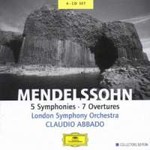
Mendelssohn: 5 Symphonies
 $65.00
Special Order
$65.00
Special Order3 - 6 weeks add to cart
FELIX MENDELSSOHN
Mendelssohn: 5 Symphonies
London Symphony Orchestra, Claudio Abbado
[ Deutsche Grammophon / 4 CD Box Set ]
Release Date: Monday 5 November 2001
This item is only available to us via Special Order. We should be able to get it to you in 3 - 6 weeks from when you order it.
"It is in the choral Second Symphony that the advantage of the wide-ranging digital sound comes out most strikingly, in clarifying the big tuttis with choir, at the same time providing extra weight of sound, notably in the way that pedal notes on the organ come over in a rich and realistic way. As to interpretation, Abbado in the first instrumental movement conveys a keener sense of joy with a wide expressive range. The yearning 6/8 movement is the more haunting too at Abbado's much slower speed, and though Abbado's slower speed for the Andante religioso brings obvious dangers of sweetness and sentimentality, he manages to avoid them completely with his warm but unmannered phrasing. Again, in the choral finale Abbado's speeds tend to be a degree more relaxed and the sense of joyful release is all the keener. His three soloists are very fine and their tonal beauty and natural feeling for words and phrasing are a delight. So too is the singing of the London Symphony Chorus, particularly beautiful in the chorale, 'Nun danket alle Gott'. Abbado's expansiveness and his more luminous choral sound has one forgetting the obvious shortcomings of the work with its unavoidable element of Victorian blandness.
It is that avoidance of Victorian blandness which is striking in Abbado's accounts of Nos 1 and 5. In No 1 he is tough and biting, slower and simpler in the second movement, returning to a tough, dark manner for the Minuet and finale.
This is a performance which has one marvelling that Mendelssohn could have ever have countenanced the idea of the Octet Scherzo as substitute, a piece so different in mood. The first movement of the Reformation finds Abbado in dramatic mood, and crisper and again quicker in the second movement Allegro vivace. (For individual comments on the Scottish and Italian symphonies see following review.) As for the overtures they too bring fresh and attractive performances, very fast and fleet in the fairy music of A Midsummer NightsDream and with the contrast between first and second subjects of The Hebrides underlined.
This was one of Abbado's biggest recording projects with the orchestra of which he was music director, and remains a richly rewarding legacy." (Gramophone)
Tracks:
Symphonies Nos. 1-5
Elizabeth Connell (soprano), Karita Mattila (soprano), Hans-Peter Blochwitz (tenor)
Scherzo from Octet, Op. 20
A Midsummer Night's Dream Overture, Op. 21
Hebrides Overture, Op. 26
Calm Sea and Prosperous Voyage, Op. 27
The Fair Melusine Overture, Op. 32
Trumpet - Overture Op. 101
Ruy Blas Overture, Op. 95
Overture for wind instruments 'Harmoniemusik', Op. 24